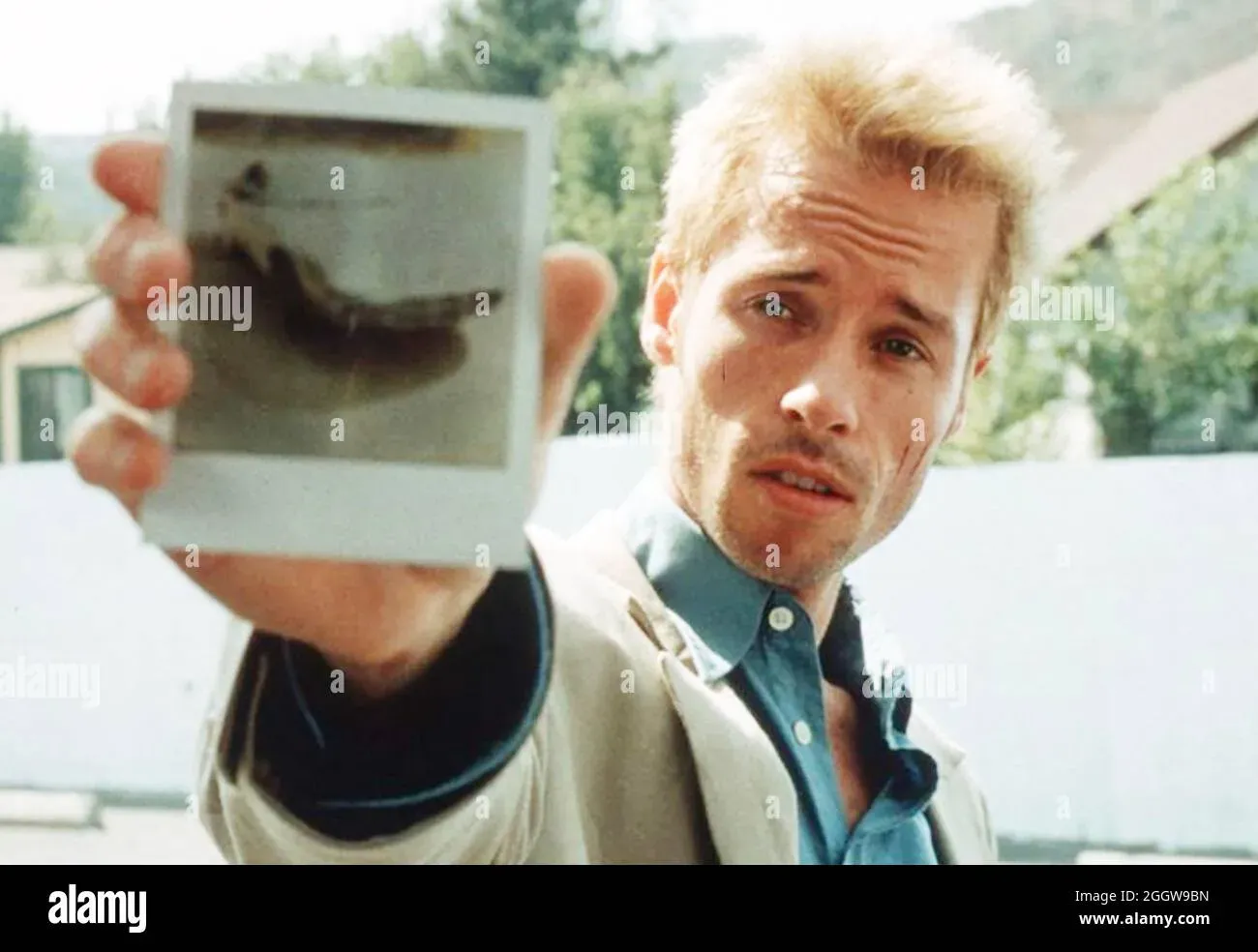Guy Pearce’s performance in Memento remains a captivating topic among cinema enthusiasts, despite the actor’s own critical view of his work. In Christopher Nolan’s groundbreaking film, Pearce portrays Leonard Shelby, a man grappling with short-term memory loss, delivering an intricate portrayal that draws viewers into his psychological turmoil. However, in a recent interview, Pearce expressed dissatisfaction with his performance, stating that watching the film left him feeling depressed about his acting choices. He recalled the struggle of balancing a flippant attitude while attempting to convey deeper emotional layers, which he ultimately felt fell short. This candid reflection on his role not only highlights the complexity of acting but also raises intriguing questions about the standards of actor performances in renowned films like Memento, making it a significant point of discussion in Guy Pearce’s career highlights.
The exploration of Guy Pearce’s role in the iconic film Memento opens a dialogue about the evolution of performances in cinema. In this psychological thriller, directed by Christopher Nolan, Pearce’s character navigates a maze of confusion and loss, showcasing the challenges actors face when embodying complex roles. Despite the film’s acclaim and its impact on Nolan’s career, Pearce’s critical perspective offers an alternative lens through which to evaluate his work. Such reflections prompt discussions about the nuances of acting and the expectations surrounding performances in celebrated films. As Pearce continues to reflect on his past roles, the insights he shares invite audiences to reconsider the artistry involved in crafting memorable characters.
Guy Pearce’s Reflective Thoughts on His Memento Performance
In a candid interview, Guy Pearce revealed his critical perspective on his iconic role in Christopher Nolan’s Memento. Despite the film being a landmark in his career and a significant achievement in cinematic storytelling, Pearce expressed profound dissatisfaction with his performance. He described watching the film and feeling a sense of dismay, stating, ‘I’m having an existential crisis.’ This self-reflection highlights the high standards Pearce sets for himself, especially when compared to the acclaim that Memento continues to receive from audiences and critics alike.
Pearce’s remarks not only illuminate his personal struggles with self-critique but also resonate with the broader theme of actor performances in high-stakes films. His admission that he felt he was ‘bad in a good movie’ underscores the pressure actors face to deliver exceptional performances, particularly in projects that have garnered significant acclaim. While many fans and critics regard Memento as a masterpiece, Pearce’s perspective serves as a reminder that even celebrated actors can grapple with self-doubt.
The Impact of Memento on Guy Pearce’s Career
Memento marked a pivotal moment in Guy Pearce’s career, showcasing his talent in a complex narrative that played with the concept of memory and identity. Despite his reservations about his performance, the film cemented Pearce’s status as a versatile actor capable of taking on challenging roles. The film’s success also catapulted Christopher Nolan into the limelight, establishing him as a director to watch. This collaboration set the stage for Nolan’s future projects, further intertwining Pearce’s career with the director’s rising fame.
However, Pearce believes that his perceived shortcomings in Memento may have affected his professional relationship with Nolan. He humorously lamented, ‘I know why I didn’t work with Chris again — it’s because I’m no good in Memento.’ This sentiment highlights how performances can shape an actor’s trajectory, influencing not only public perception but also future collaborations with notable filmmakers. Despite this, Pearce’s body of work continues to grow, encompassing various genres and roles that showcase his breadth as an actor.
Revisiting Guy Pearce’s Career Highlights
Guy Pearce’s career spans an impressive array of films that highlight his versatility and depth as an actor. From his breakout role in Neighbours to his acclaimed performance in L.A. Confidential, Pearce has consistently demonstrated an ability to inhabit diverse characters. His roles have varied from dramatic to comedic, showcasing his range and adaptability in the film industry. Each project has contributed to his reputation as a skilled performer, even as he grapples with his self-critique of certain performances.
In recent years, Pearce has continued to build on his career highlights, taking on roles that challenge him and allow for artistic growth. His willingness to reflect on past performances, including his work in Memento, speaks to his commitment to his craft. While some performances may not resonate with him, they remain a crucial part of his journey as an actor. Pearce’s ability to navigate the complexities of his career, including the ups and downs of self-evaluation, ultimately enhances his artistry and connection with audiences.
The Role of Self-Critique in Acting
Self-critique is an integral part of an actor’s development, and Guy Pearce’s reflections on his performance in Memento exemplify this process. Actors often revisit their past work, seeking areas for improvement and growth. Pearce’s candid acknowledgment of his dissatisfaction reveals a profound understanding of the art form and the pressure to meet both personal and public expectations. This introspective approach not only fosters personal growth but also enhances an actor’s ability to connect with their audience on a deeper level.
Moreover, the practice of self-critique can lead to richer performances in future projects. Pearce’s critical lens on his past work encourages a continual evolution of his acting style. By identifying what he perceives as flaws in Memento, he opens the door for self-improvement and evolution in his craft. This cycle of reflection and growth is essential in the world of acting, where the landscape is perpetually changing, and actors must adapt to new challenges and opportunities.
Exploring Christopher Nolan’s Influence on Guy Pearce’s Work
Christopher Nolan’s directorial vision has significantly shaped the landscape of modern cinema, and his collaboration with Guy Pearce in Memento remains a pivotal moment for both artists. Nolan’s unique storytelling techniques and intricate narratives have influenced Pearce’s approach to his roles, pushing him to explore deeper emotional connections within his characters. The psychological complexity of Memento is a testament to Nolan’s ability to challenge actors to deliver profound performances, even as Pearce grapples with his self-critique.
The impact of Nolan’s direction on Pearce’s career extends beyond just Memento. The film’s groundbreaking narrative structure and themes of memory and identity have influenced how Pearce approaches his roles in subsequent projects. Even in the absence of future collaborations, the experience of working with Nolan has undoubtedly left a lasting impression on Pearce’s artistic journey, encouraging him to embrace complexity in his performances and storytelling.
The Lasting Legacy of Memento in Film History
Memento stands as a significant milestone in film history, not only for its innovative narrative structure but also for its profound impact on viewers and critics alike. The film’s exploration of memory and perception has sparked discussions about the nature of storytelling in cinema. Guy Pearce’s role as Leonard Shelby remains a central aspect of this dialogue, as it encapsulates the struggles of a man grappling with his fragmented memories. Despite Pearce’s own reservations about his performance, it has become an integral part of the film’s legacy, resonating with audiences for years.
The legacy of Memento also extends to its influence on subsequent filmmakers and their approach to storytelling. Many directors cite Nolan’s work as a reference point for crafting intricate narratives that challenge viewers. Pearce’s performance, while he may critique it, is intertwined with this legacy, showcasing the power of cinema to evoke deep emotional responses and provoke thought. This ongoing discussion surrounding Memento highlights the lasting relevance of the film in both academic and popular discourse.
Guy Pearce’s Evolving Relationship with His Filmography
As an actor, Guy Pearce’s relationship with his filmography is complex and continually evolving. With each passing year and new project, Pearce reflects on his past roles, including those he views negatively, such as his performance in Memento. This evolving perspective allows him to grow as an artist, as he learns from both his successes and perceived failures. Pearce’s willingness to confront his own critiques demonstrates a maturity that is essential for any long-term career in the entertainment industry.
Additionally, Pearce’s self-examination of his performances influences how he approaches new roles. By analyzing the elements he feels fell short in Memento, he can bring renewed focus and awareness to his future characters. This proactive approach to his career allows him to continually refine his craft, ensuring that he remains relevant in an ever-changing industry. Pearce’s journey as an actor is one of resilience, adaptation, and a commitment to personal and professional growth.
The Influence of Audience Reception on Actor Performances
Audience reception plays a crucial role in shaping an actor’s perception of their performances. For Guy Pearce, the acclaim surrounding Memento contrasts sharply with his personal dissatisfaction. This dichotomy highlights the complex relationship between an actor’s self-assessment and public perception. While audiences may celebrate his performance as pivotal to the film’s success, Pearce’s inner critique reveals the pressures actors face to meet expectations, both their own and those of viewers.
Moreover, audience feedback can often steer an actor’s future choices and collaborations. Pearce’s belief that his performance in Memento affected his working relationship with Nolan underscores the influence of public reception on career trajectories. As actors navigate their careers, they must balance their own self-critique with the external validation they receive, which can ultimately guide their professional decisions and the types of roles they pursue.
Guy Pearce’s Role in the Evolution of Modern Cinema
Guy Pearce’s contributions to film extend beyond his individual performances; he plays a significant role in the evolution of modern cinema. His work in films like Memento has paved the way for complex narratives that challenge traditional storytelling. Pearce’s ability to embody multifaceted characters has influenced a generation of actors and filmmakers, encouraging them to explore deeper themes and emotions in their own work. This evolution reflects the changing landscape of cinema, where character-driven stories are becoming increasingly prominent.
Furthermore, Pearce’s reflections on his performances, including those he critiques, contribute to the ongoing dialogue about acting and authenticity in film. By openly discussing his feelings about Memento and other roles, he adds to the discourse on the pressures actors face in delivering memorable performances. His journey through various genres and roles illustrates the importance of adaptability in the film industry, further solidifying his legacy as a key figure in modern cinematic history.
Frequently Asked Questions
What did Guy Pearce say about his performance in Memento?
Guy Pearce expressed that he is not pleased with his performance in Memento, stating in a recent interview that he felt he was ‘bad in a good movie.’ Despite Memento being a critically acclaimed film directed by Christopher Nolan, Pearce believes his portrayal did not meet his own standards.
How does Guy Pearce feel about his career highlights compared to Memento?
While Guy Pearce acknowledges his satisfaction with performances in films like L.A. Confidential, he regards his work in Memento with disappointment, rating it a ‘five’ on his personal scale. He feels that his performance detracted from the film’s overall quality.
What impact did Memento have on Guy Pearce’s career?
Memento was a significant film for Guy Pearce, marking a turning point in his career. However, Pearce has mentioned that he believes his performance in the film may have hindered future collaborations with director Christopher Nolan, stating he thinks it is the reason Nolan has not cast him in any subsequent projects.
Why does Guy Pearce consider Memento a difficult watch?
Guy Pearce referred to watching Memento as ‘nails on a chalkboard’ for him, indicating that he finds it challenging to view due to his critical perspective on his own performance. His recent viewing led him to an existential crisis about his acting choices in the film.
How does Guy Pearce’s view on Memento compare to other Christopher Nolan movies?
While Guy Pearce has had a successful career with various acclaimed films, he specifically criticizes his performance in Memento in contrast to other Christopher Nolan movies. He feels that, despite the film’s brilliance, his portrayal did not align with the high standards set by the project.
What does Guy Pearce think about the idea of being good in a bad movie?
Guy Pearce referenced John Gielgud’s quote about being ‘good in a good movie’ and expressed regret over feeling he was ‘bad in a good movie’ with his role in Memento. This reflects his belief that his performance did not do justice to the quality of the film.
Has Guy Pearce reflected on his performance in Memento over the years?
Yes, Guy Pearce has reflected on his performance in Memento multiple times. In a recent interview, he revisited the film and recognized his dissatisfaction with his earlier portrayal, indicating an ongoing struggle with that aspect of his career.
What is the significance of Memento in Guy Pearce’s filmography?
Memento is often considered a breakthrough film in Guy Pearce’s filmography, showcasing his potential as an actor, despite his own critical view of his performance. It remains a landmark project in Christopher Nolan’s career as well, further highlighting its importance.
| Key Points | Details |
|---|---|
| Guy Pearce’s Self-Assessment | Pearce expressed dissatisfaction with his performance in Memento, stating he felt he was ‘bad in a good movie.’ |
| Existential Crisis | He mentioned having an existential crisis after rewatching the film, feeling depressed about his acting. |
| Critique of Performance | Pearce aimed for a flippant attitude but found it was executed poorly, leading to regret about his portrayal. |
| Comparison to Other Works | He compared his performance in Memento unfavorably to his role in L.A. Confidential, which he is proud of. |
| Impact on Career | Pearce speculated that his performance in Memento might be the reason Christopher Nolan has not cast him in future projects. |
| Duration Since Last Collaboration | It has been over two decades since Pearce collaborated with Nolan on any project. |
Summary
Guy Pearce’s Memento performance has been a topic of introspection for the actor himself, who expresses a critical view of his work in the film. Despite its acclaim and being a breakthrough for director Christopher Nolan, Pearce’s personal assessment reflects a deep dissatisfaction, which has led him to believe that this might have affected his future collaborations with Nolan. His candid remarks reveal the pressure actors often feel regarding their performances, especially in critically acclaimed films.








